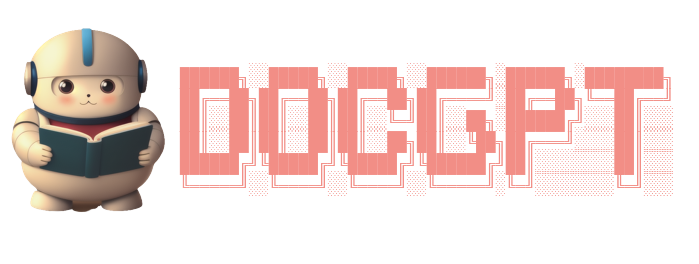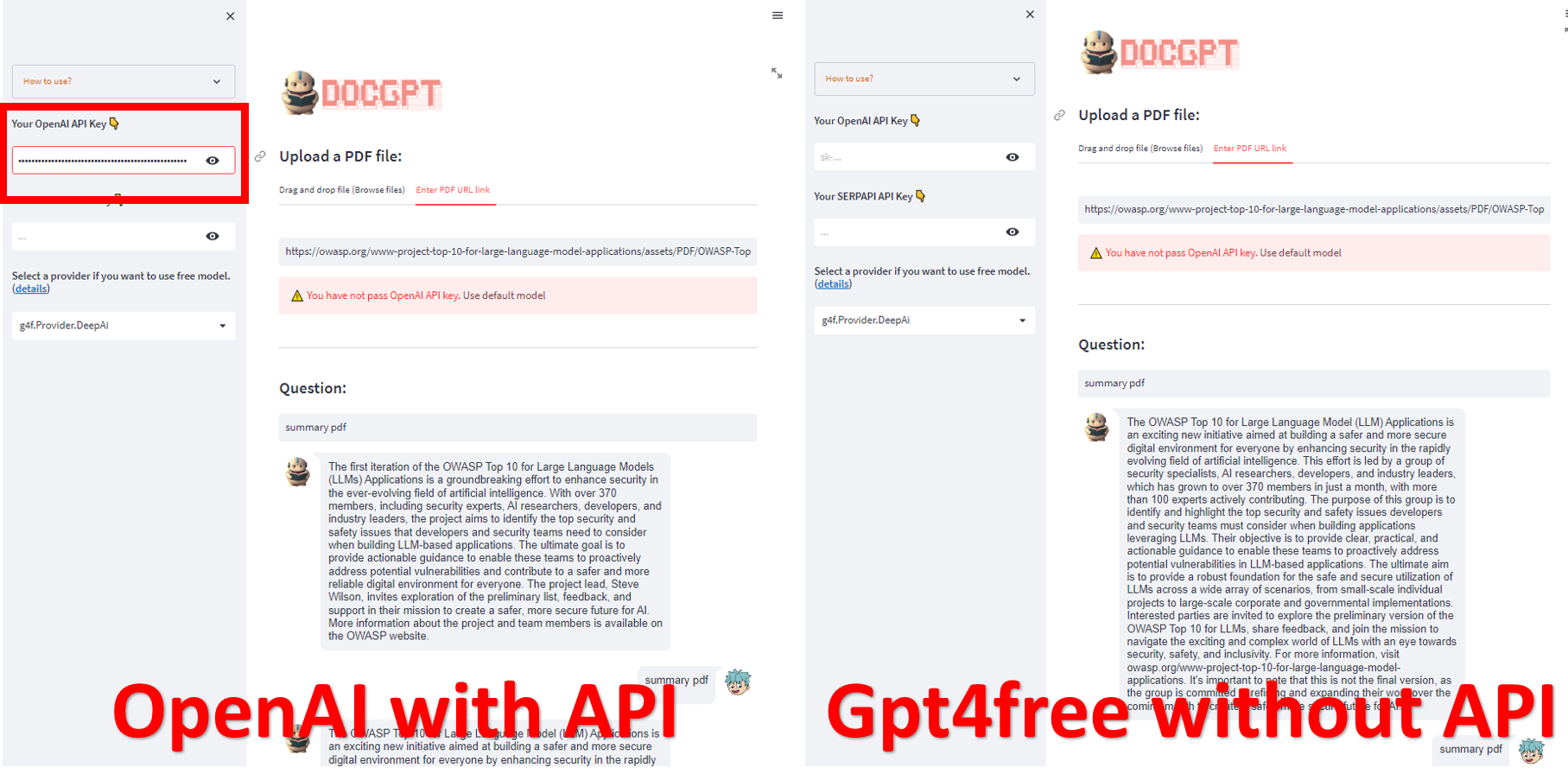- Table of Contents
- Main Development Software and Packages:
Python 3.10.11Langchain 0.0.218Streamlit 1.22.0- more
If you like this project, please give it a ⭐Star to support the developers~
-
Upload a PDF link from your local device (or a PDF link) and query
docGPTabout the content of the PDF. For example, you can ask GPT to summarize an article. -
Provide two models:
gpt4free- Completely free, allowing users to use the application without the need for API keys or payments.
- Select the
Provider. For more details aboutgpt4free, please refer to the source project.
openai- Requires an
openai_api_key, which you can obtain from this link. - If you have an
serpapi_key, AI responses can include Google search results.
- Requires an
gpt4freeIntegration: Everyone can usedocGPTfor free without needing an OpenAI API key.- Direct PDF URL Input: Users can input PDF
URLlinks for parsing without uploading.pdffiles. - Langchain Agent: Enables AI to answer current questions and achieve Google search-like functionality.
- User-Friendly Environment: Easy-to-use interface for simple operations.
-
LangChain is a framework for developing applications powered by language models. It supports the following applications:
- Connecting LLM models with external data sources.
- Interactive communication with LLM models.
-
For more details about LangChain, refer to the official documentation.
For questions that ChatGPT can't answer, turn to LangChain!
LangChain fills in the gaps left by ChatGPT. Through the following example, you can understand the power of LangChain:
In cases where ChatGPT can't solve mathematical problems or answer questions about events after 2020 (e.g., "Who is the president in 2023?"):
- For mathematical problems: There's a math-LLM model dedicated to handling math queries.
- For modern topics: You can use Google search.
To create a comprehensive AI model, we need to combine "ChatGPT," "math-LLM," and "Google search" tools.
In the non-AI era, we used
if...else...to categorize user queries and had users select the question type through UI.In the AI era, users should be able to directly ask questions without preselecting the question type. With LangChain's agent:
- We provide tools to the agent, e.g.,
tools = ['chatgpt', 'math-llm', 'google-search'].- Tools can include chains designed using LangChain, such as using a retrievalQA chain to answer questions from documents.
- The agent automatically decides which tool to use based on user queries (fully automated).
Through LangChain, you can create a universal AI model or tailor it for business applications.
-
🎬Visit the application.
-
🔑Enter your
API_KEY(optional in Version 3, as you can use thegpt4freefree model):OpenAI API KEY: Ensure you have available usage.SERPAPI API KEY: Required if you want to query content not present in the PDF.
-
📁Upload a PDF file (choose one method)
- Method 1: Browse and upload your own
.pdffile from your local machine. - Method 2: Enter the PDF
URLlink directly.
- Method 1: Browse and upload your own
-
🚀Start asking questions!
A step-by-step tutorial to quickly build your own chatGPT!
First, clone the repository using git clone https://github.com/Lin-jun-xiang/docGPT-streamlit.git.
There are two methods:
-
Local development:
pip install -r requirements.txt: Download the required packages for development.streamlit run ./app.py: Start the service in the project's root directory.- Start exploring!
-
Use Streamlit Community Cloud for free deployment, management, and sharing of applications:
- Place your application in a public GitHub repository (ensure you have
requirements.txt). - Log in to share.streamlit.io.
- Click "Deploy an App," then paste your GitHub URL.
- Complete deployment and share your application.
- Place your application in a public GitHub repository (ensure you have
To build a powerful docGPT model in LangChain, consider these tips to enhance performance:
-
Language Model
Select an appropriate LLM model, such as OpenAI's
gpt-3.5-turboor other models. Experiment with different models to find the best fit for your use case.# ./docGPT/docGPT.py llm = ChatOpenAI( temperature=0.2, max_tokens=2000, model_name='gpt-3.5-turbo' )
Please note that there is no best or worst model. You need to try multiple models to find the one that suits your use case the best. For more OpenAI models, please refer to the documentation.
(Some models support up to 16,000 tokens!)
-
PDF Loader
Choose a suitable PDF loader. Consider using
PyMuPDFfor fast text extraction andPDFPlumberfor extracting text from tables.(official Langchain documentation)
PyPDF: Simple and easy to use.PyMuPDF: Reads the document very quickly and provides additional metadata such as page numbers and document dates.PDFPlumber: Can extract text within tables. Similar to PyMuPDF, it provides metadata but takes longer to parse.
If your document contains multiple tables and important information is within those tables, it is recommended to try
PDFPlumber, which may give you unexpected results!Please do not overlook this detail, as without correctly parsing the text from the document, even the most powerful LLM model would be useless!
-
Tracking Token Usage
Implement token usage tracking with callbacks in LangChain to monitor token and API key usage during the QA chain process.
When using
chain.run, you can try using the method provided by Langchain to track token usage here:from langchain.callbacks import get_openai_callback with get_openai_callback() as callback: response = self.qa_chain.run(query) print(callback) # Result of print """ chain... ... > Finished chain. Total Tokens: 1506 Prompt Tokens: 1350 Completion Tokens: 156 Total Cost (USD): $0.03012


